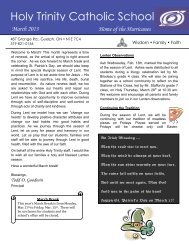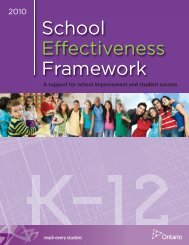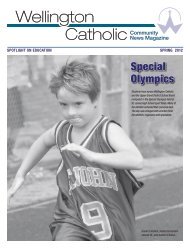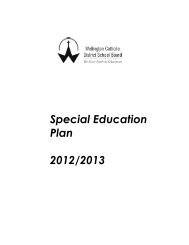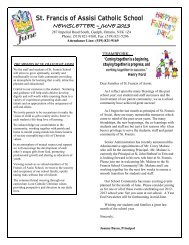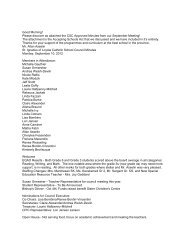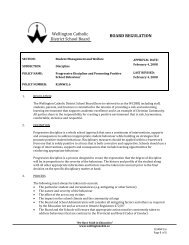WCDSB Course Calendar 2012-2013 - Wellington Catholic
WCDSB Course Calendar 2012-2013 - Wellington Catholic
WCDSB Course Calendar 2012-2013 - Wellington Catholic
You also want an ePaper? Increase the reach of your titles
YUMPU automatically turns print PDFs into web optimized ePapers that Google loves.
Goals andObjectivesGoals: To educate all students in a <strong>Catholic</strong> Christian setting which models Christ. To prepare our students to be contributing members of society, both nowand in the future. To show our love for God by our love for each other.Objectives: To pursue academic excellence. To provide students with varied work related experiences. To promote the dignity of all pathways by providing varied educationalprograms which suit the individual needs and aspirations of all students. To offer meaningful religion courses and an active liturgical program. To promote an awareness and involvement in the community. To foster a positive sense of self for students and staff. To provide a varied co-curricular program that stresses participationand personal fitness. To develop a sense of pride in Canada’s heritage and an awarenessof human rights.Success in High School:The <strong>Wellington</strong> <strong>Catholic</strong> School Board believes that all students can succeed.Our goal is to ensure that students graduate from high school so that they maymove on to the pathway destination of their choice. Pathways can lead to adestination of choice: Apprenticeship, College, University or Work.Every student learns differently.There are six ways current students can participate in innovative programsthat help take students beyond the traditional classroom. These includeStudent Success Teams, Specialist High Skills Majors, Lighthouse Projects,Expanded Co-op Projects, Dual Credit Programs, and an expanded focus onthe Grade 8 to 9 transition. Further information can be found atwww.ontario.ca/6ways. The first key to success is the careful selection ofcourse levels in Grade 9. <strong>Course</strong>s must provide challenge without a risk offailure in order for students to begin and end their years at high school withSUCCESS.Guidance ServicesStudents will receive an AGENDA PLANNER in September which gives acomplete overview of School Expectations, Major School Events, Clubs andActivities, as well as the Code of Conduct. This planner will also help studentswith their organization and time management.Student Records: Ontario Student Record (OSR) and Transcript (OST):An Ontario Student Record is maintained for each student. It contains copiesof student report cards from each grade and other important information.This OSR folder is retained for 55 years after a student graduates or retires.The Ontario Student Transcript provides full disclosure of students’ credithistory. Print outs are available as needed.Full Disclosure: As of September 1999, student transcripts will show allcourse attempts and their results for Grade 11 and 12 courses. For a coursethat is repeated, the course with the lower mark will have “R” entered in thecredit column. <strong>Course</strong>s that have a “failed” mark will be entered on theOntario Student Transcript. Senior courses that students “withdraw” fromfive days or more following the receipt of their first progress report will have“W” recorded in the credit column. The estimated mark at the time ofwithdrawal will be recorded.The Guidance Department provides students with assistance inexploring their academic goals, post-secondary information, careerand employment planning, and personal counselling.ExceptionalStudentsSpecialized PathwaysStudents benefitting from differentiated programs can work towards achievingtheir OSSD (30 credits), Ontario Secondary School Certificate (14 credits) or aCertificate of Accomplishment (fewer than 14 credits).Locally developed courses have been developed in English, Science, Historyand Mathematics in order to assist with success during their initial years athigh school.Learning Strategies (GLE 101/102) also builds a foundation for furtherlearning by increasing students’ confidence, motivation, and ability to learn.A student that successfully completes the locally developed courses maybe recommended by the school to attempt the Grade 9 Core courses(English, Math and Science) at the applied level to further prepare themfor senior curriculum. Senior Workplace courses and co-op experiencesenhance their overall development, maturity and preparation forindependence in the community.Non-credit <strong>Course</strong>sStudents whose IEP indicates that they work on individualized expectationsrather than specific curriculum expectations will have their program basedon annual goals noted on the IEP. A number of courses may be K coded(e.g. KMM 101 – Numeracy and Numbers).Special Education Advisory Committee (SEAC)The <strong>Wellington</strong> County <strong>Catholic</strong> District School Board’s Special EducationAdvisory Committee (SEAC) is a committee created under the Education Actto make recommendations to the board about matters affecting theestablishment and development of special education programs and servicesfor exceptional pupils in the board. The SEAC is made up of parents, trustees,and community representatives who meet regularly to discuss information andpolicies about the education of exceptional children.3





